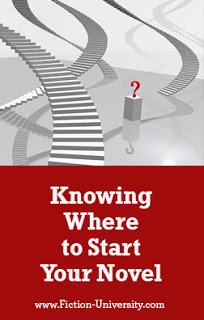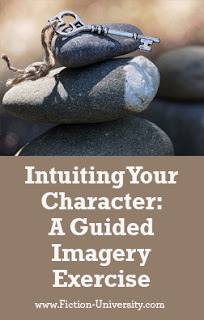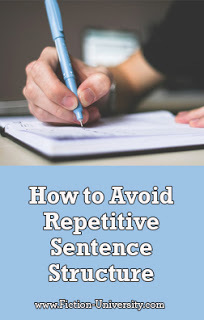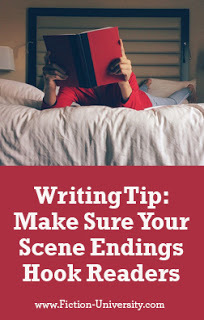Janice Hardy's Blog, page 84
January 26, 2019
Real Life Diagnostics: Can You Feel Any Tension or Conflict in This Scene?
 Critique By Maria D'Marco
Critique By Maria D'Marco Real Life Diagnostics is a weekly column that studies a snippet of a work in progress for specific issues. Readers are encouraged to send in work with questions, and we diagnose it on the site. It’s part critique, part example, and designed to help the submitter as well as anyone else having a similar problem.
If you're interested in submitting to Real Life Diagnostics, please check out these guidelines.
Submissions currently in the queue: Three
Please Note: As of today, RLD slots are booked through February 16.
This week’s questions:
1. Is it showing vs telling?
2. Can you feel any tension or conflict?
Market/Genre: Romantic Comedy
On to the diagnosis…
Continue ReadingWritten by Janice Hardy. Fiction-University.com

Published on January 26, 2019 03:00
January 25, 2019
The Line Forms Where? Knowing Where to Start Your Novel
 By Janice Hardy, @Janice_Hardy
By Janice Hardy, @Janice_HardyThis Week's Refresher Friday takes another look at analyzing your novel to ensure you're starting it i the right pace. Enjoy!
Openings are hard, especially if you're not sure if you're starting in the right place. The sheer amount of "is this opening working?" submissions I get in Real Life Diagnostics is testament to that.
The old "start with the action" has frustrated many a writer due to its ambiguity, and even when we think we've done it all correctly, beta readers can still feel the opening isn't grabbing them.
I've talked about first lines and first pages before, so today, let's focus on figuring out where to start your story, and how to diagnose it if you're worried you're starting in the wrong place.
First, analyze your current opening, either the first scene or the first chapter if it's only one scene:
Continue ReadingWritten by Janice Hardy. Fiction-University.com

Published on January 25, 2019 03:00
January 24, 2019
Using Vocal Cues to Show Hidden Emotion
 By Becca Puglisi, @beccapuglisi
By Becca Puglisi, @beccapuglisiPart of The How They Do It Series
JH: Tapping into the hidden emotions and subtext of a scene is a wonderful way to pull readers into that scene. Becca Puglisi visits the lecture hall today to share her tips on creating subtext and using vocal cues to show the hidden emotional layers of your characters.
Becca Puglisi is an international speaker, writing coach, and author of bestselling books for writers—including her latest publication: a second edition of The Emotion Thesaurus, an updated and expanded version of the original volume. Her books are available in multiple languages, are sourced by US universities, and are used by novelists, screenwriters, editors, and psychologists around the world. She is passionate about learning and sharing her knowledge with others through her Writers Helping Writers blog and via One Stop For Writers—a powerhouse online library created to help writers elevate their storytelling.
Website | Goodreads | Facebook | Twitter |
Take it away Becca...
Continue ReadingWritten by Janice Hardy. Fiction-University.com

Published on January 24, 2019 03:00
January 23, 2019
Do You Think He Likes Me? Conveying Emotions in Your Novel
 By Janice Hardy, @Janice_Hardy
By Janice Hardy, @Janice_Hardy Today's Afternoon Rewind takes another look at conveying emotions in your novel. Enjoy!
Describing outward emotions can often sound forced because people in the moment feeling those emotions aren't usually thinking, "I just want to stare deeply into his eyes." They're thinking about the color, the way the other person makes their heart race, how time seems to stop when their gazes meet. It's the effect of that deep gazing that's on their minds not the actual gazing part.
Let's say you're writing a situation that requires an emotional response. Instead of looking at the character who's about to become emotional in some way, try going inside her head and thinking about what that person would feel.
Continue ReadingWritten by Janice Hardy. Fiction-University.com

Published on January 23, 2019 12:30
Three Mistakes to Avoid When Creating Stakes in Your Story
 By Janice Hardy, @Janice_Hardy
By Janice Hardy, @Janice_HardyStakes are critical to any story, because without stakes, why should readers care about what's going on?
Storytelling problems often appear in one of three areas—lack of goals, conflicts, or stakes. There’s a reason these three things make up the holy trinity of good storytelling. They work best when balanced, holding up the story like a three-legged stool. Weaken any one leg, and the stool (and story) collapses.
Goals drive the plot, conflicts create the suspense, but the stakes make readers emotionally invest in the story. Stakes make them care about the characters and their dreams, and makes them worry they won’t overcome their problems and succeed. It doesn’t matter if what’s at stake is one small grade on a test or the fate of the world, the risks and consequences of the characters’ actions affect how much readers care.
Continue ReadingWritten by Janice Hardy. Fiction-University.com

Published on January 23, 2019 06:12
January 22, 2019
Intuiting Your Character: A Guided Imagery Exercise
 By Bonnie Randall
By Bonnie Randall Part of the How They Do It Series (Contributing Author)
During a recent retreat, I had the pleasure of participating in a guided imagery which, through symbolic interpretation, offered insight which I immediately wanted to apply to fiction characters I have created, past and present.
Directions: In order to partake in this exercise, you must be willing to fully immerse yourself into becoming your character. In other words, when faced with the following series of questions, do NOT answer with what you think, but rather write down—in as much detail as possible—the FIRST AND MORE INTUITIVE IMPRESSION your character receives after being faced with each of the following scenarios:
Now let’s start:
Continue ReadingWritten by Janice Hardy. Fiction-University.com

Published on January 22, 2019 03:00
January 21, 2019
Are You Missing Opportunities to Make Your Writing Stronger?
 By Janice Hardy, @Janice_Hardy
By Janice Hardy, @Janice_Hardy Today's Afternoon Rewind takes another look at ways to make your writing stronger. Enjoy!
There are a lot of rules in writing. Some are solid ones, such as rules of spelling or grammar, but others are more nebulous, such as how to start a scene, or whether or not to use adverbs. And some of these "rules" have become commonplace because it's harder to explain to new writers how to do it well, and much easier to just say "don't do it."
I like to look at these ambiguous rules as opportunities to improve a sentence or scene. They're opportunities to strengthen your novel and improve your own writing skills by learning why a rule exists and how to use it or break it when necessary.
Continue ReadingWritten by Janice Hardy. Fiction-University.com

Published on January 21, 2019 12:30
How to Avoid Repetitive Sentence Structure
 By Janice Hardy, @Janice_Hardy
By Janice Hardy, @Janice_Hardy “List-like prose" can occur in a variety of ways, and they all have the same result—flat writing.
Writing is more than simply writing down what happens in a scene. Good writing has a musical flow, drawing the reader into and through the paragraph and seamlessly handing them off to the next paragraph. Without that flow, you get a monotonous rhythm that puts readers to sleep:
I ran down to the lake to look for my little sister, Georgia. I found her sitting on the dock, her feet dangling in the water. I yelled for her to come home, but she didn't seem to hear me. I went over and nudged her in the arm. She screamed and fell off the dock into the water. I just laughed.-Yawn-
Continue ReadingWritten by Janice Hardy. Fiction-University.com

Published on January 21, 2019 06:05
January 20, 2019
Sunday Writing Tip: Make Sure Your Scene Endings Hook Your Readers
 By Janice Hardy, @Janice_Hardy
By Janice Hardy, @Janice_Hardy Each week, I’ll offer a tip you can take and apply to your WIP to help improve it. They’ll be easy to do and shouldn’t take long, so they’ll be tips you can do without taking up your Sunday. Though I do reserve the right to offer a good tip now and then that will take longer—but only because it would apply to the entire manuscript.
This week, check how you end each scene and/or chapter and make sure you’re giving readers a reason to turn the page.
A scene break or chapter ending is a natural place for readers to put down a book, and sometimes we write it that way without considering the downsides. Characters go to sleep, they leave for a journey, they settle in to wait—they at in ways that say “pause the story here” in some way.
Continue ReadingWritten by Janice Hardy. Fiction-University.com

Published on January 20, 2019 05:29
January 19, 2019
Real Life Diagnostics: Is This Opening Working?
 Critique By Janice Hardy, @Janice_Hardy
Critique By Janice Hardy, @Janice_HardyReal Life Diagnostics is a weekly column that studies a snippet of a work in progress for specific issues. Readers are encouraged to send in work with questions, and we diagnose it on the site. It’s part critique, part example, and designed to help the submitter as well as anyone else having a similar problem.
If you're interested in submitting to Real Life Diagnostics, please check out these guidelines.
Submissions currently in the queue: One
Please Note: As of today, RLD slots are booked through January 26.
This week’s questions:
Does this opening work? Does it feel like telling? Would an agent ask for more?
Market/Genre: Romantic thriller
On to the diagnosis…
Continue ReadingWritten by Janice Hardy. Fiction-University.com

Published on January 19, 2019 06:32



